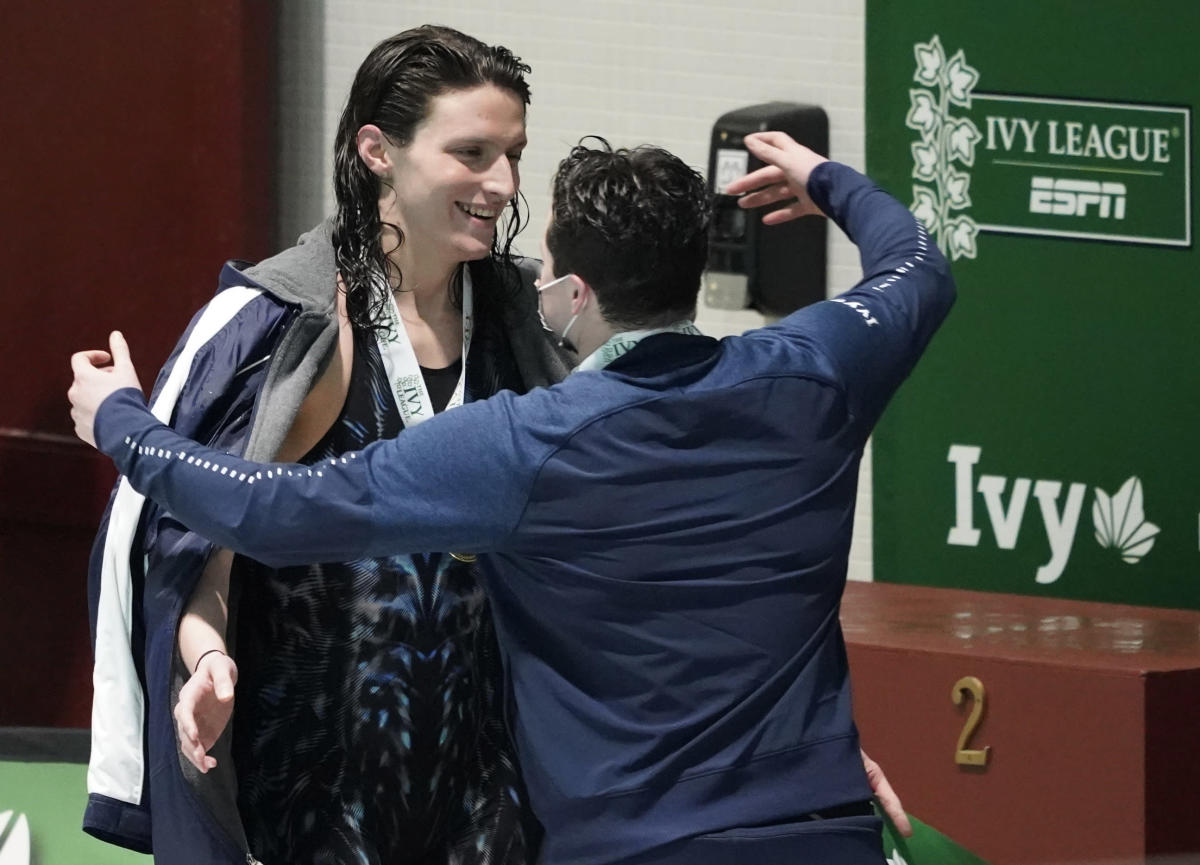
CAMBRIDGE, Mass. (AP) — Lia Thomas ended an intense week of scrutiny with a hug.
Seconds after edging Yale’s Iszac Henig to win the 100-meter freestyle title at the Ivy League championships Saturday, Thomas stepped out of the pool and walked to the back of the deck.
After taking a moment to towel off, the transgender swimmer for Penn turned to her right and embraced Henig, a transgender man who swims for Yale’s women’s team.
The matchup was the culmination of strong championship performances by both athletes, who’ve dealt this week with increased media coverage of their personal stories as part of an ongoing national conversation about the rules that govern the participation of transgender athletes in college athletics.
Thomas’ win was a school- and meet-record time of 47.63, and marked her third individual title at the Ivy championships following a dominating season. Henig placed second in 47.82, followed by Princeton’s Nikki Venema in 48.81
But Thomas’ success this season has prompted some — even purportedly on her own team — to question whether she has an advantage since she was born as a biological male. Thomas has followed NCAA and Ivy League rules since she began her transition in 2019 by starting hormone replacement therapy.
Henig beat Thomas in the 100 freestyle at a meet last month, and was the top qualifier heading into Saturday’s final after winning her heat in the morning preliminaries in a meet-record time of 47.80. Thomas qualified second.
They were side-by-side in Saturday night’s final, Henig in Lane 4 and Thomas in Lane 5. But Thomas had a faster reaction time at the start to take an early advantage. Henig came back to briefly at the halfway point, but was out-touched by Thomas at the finish.
Neither Thomas nor Henig were available for interviews afterward, but they had lots of support inside the Harvard University Blodgett Pool complex.
Swimmers from multiple schools wore “8 Against Hate” t-shirts, a conference-wide initiative aimed and denouncing all forms for hatred and discrimination.
Schuyler Bailar, who swam against Thomas when he competed for Harvard as one of the first openly transgender swimmers in the NCAA, was also in the stands. He said watching both Thomas and Henig in the pool this week was special.
“It means a lot to me,” he said. “When I was competing, I was the only openly trans person as far as I knew in NCAA swimming. … It felt very lonely at times. The last time I competed was here at this pool and the last time I was here was at that meet. So to come in and to to watch Lia and Iszac, both transgender swimmers in the Ivy League and in my home pool has been really powerful.”
Thomas won the 200 freestyle final Friday in a pool- and meet-record time of 1 minute, 43.12 seconds, eclipsing the marks set by Harvard’s Miki Dahlke in 2018 (1:45.00) and 2020 (1:43.78). Thomas had entered the championship with the top time in the nation this year in the 200 freestyle (1:41.93).
Friday’s victory was closer than her win Thursday in the 500 freestyle, in which she set a pool record in a time of 4:37.32 and finished a half a pool length ahead.
Henig took Thursday’s 50 freestyle final in a pool-record time of 21.93 and entered this week as the conference’s fifth-fastest qualifier in the 200 freestyle. But he opted not to compete in that event on Friday against Thomas, the top qualifier. Instead, Henig swam in the 100 butterfly and finished third.
While Thomas’ success has been met with some criticism, Bailar said the discussions are important for the future of athletics as a whole.
“The fear is trans people are going to dominate sports. Cis people dominate sports. We have two here,” Bailar said. “I think it’s incredibly important people know trans people exist. To hear our testimonies as humans. … I think a lot of people are missing the human part of this. Lia, me, Iszac — we are all real people. I think that part is really important that we all get to be seen as whole humans.
“It’s so important for us to just talk about ourselves and be ourselves.”
